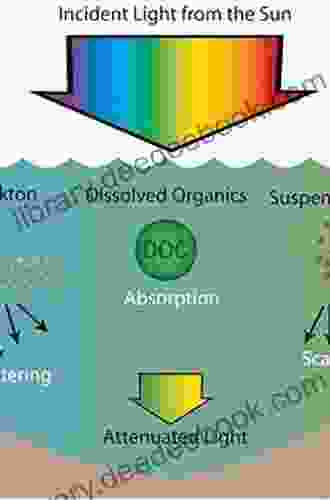Why Is the Sea Salty: Unveiling the Secrets of Ocean Salinity

The vast expanse of the world's oceans, covering over 70% of the Earth's surface, holds a myriad of mysteries and wonders. One of the most fundamental and enduring questions about this aquatic realm is the origin of its salinity, or saltiness. Why is the sea salty, and what processes have shaped its current composition? This article delves into the intricate mechanisms that contribute to the salinity of the oceans, unraveling the secrets behind this essential characteristic of our planet's hydrosphere.
Sources of Salinity
The salinity of the oceans is primarily attributed to the accumulation of dissolved salts over millions of years. These salts originate from various sources, including:
4.6 out of 5
| Language | : | English |
| File size | : | 220 KB |
| Text-to-Speech | : | Enabled |
| Screen Reader | : | Supported |
| Enhanced typesetting | : | Enabled |
| Word Wise | : | Enabled |
| Print length | : | 29 pages |
1. Weathering of Rocks:
The relentless forces of weathering, such as rain, wind, and ice, act upon rocks and minerals on land, breaking them down and releasing ions into rivers and streams. These ions, including sodium, chloride, and calcium, are eventually transported to the oceans.
2. Volcanic Activity:
Volcanic eruptions spew forth molten rock, ash, and gases into the atmosphere. As these materials cool and interact with seawater, they release ions, contributing to the ocean's salt content. Submarine volcanoes also directly discharge dissolved salts into the marine environment.
3. Seafloor Hydrothermal Vents:
Along the ocean floor, hydrothermal vents spew hot, mineral-rich fluids into the surrounding seawater. These fluids are highly saline and contain dissolved metals and sulfides, further enriching the ocean's salt concentration.
Mechanisms of Salt Accumulation
The saltiness of the oceans is not simply the result of a cumulative process; there are also mechanisms that prevent the removal of salts.
1. Evaporation:
When sunlight heats the ocean surface, water evaporates, leaving behind dissolved salts. Over time, this process leads to the gradual increase in the salt content of seawater.
2. Freezing:
When seawater freezes, the salt ions are excluded from the ice crystals. This results in the formation of briny pockets of water between the ice crystals, increasing the salinity of the unfrozen seawater.
Geographical Distribution of Salinity
The salinity of the oceans varies depending on the location and environmental conditions. Factors such as latitude, temperature, precipitation, and evaporation rates contribute to these regional variations.
1. Latitudinal Gradient:
Generally, ocean salinity is highest in tropical regions and lowest near the poles. Evaporation rates are higher in the tropics, leading to increased salt accumulation.
2. Temperature Effect:
Higher temperatures increase evaporation rates, resulting in higher salinity. Warmer waters also have a lower capacity to hold dissolved gases, such as carbon dioxide, which can lower the pH and promote the precipitation of salts.
3. Precipitation and Runoff:
Areas with high precipitation and river runoff tend to have lower salinity because freshwater dilutes the salt content. Conversely, regions with low rainfall and limited freshwater input have higher salinity.
The Importance of Salinity
The salinity of the oceans plays a crucial role in maintaining the planet's ecological balance and supporting various marine life forms.
1. Marine Ecosystems:
Salinity is essential for the survival of marine organisms, which have evolved adaptations to specific salinity ranges. Different species have different tolerance levels, and changes in salinity can affect their distribution, growth, and reproduction.
2. Climate Regulation:
The oceans act as a vast reservoir of heat and carbon dioxide, influenced by salinity. Salinity affects the density and circulation patterns of seawater, which in turn impacts climate systems and global weather patterns.
3. Geological Processes:
Salinity influences the formation of marine sediments and the precipitation of minerals on the ocean floor. The deposition and diagenesis of these sediments contribute to the geological evolution of the Earth's crust.
The salinity of the oceans is a complex and dynamic phenomenon shaped by geological processes, climatic conditions, and geographical factors. The dissolved salts originate from various sources, including weathering, volcanic activity, and hydrothermal vents, and are accumulated through evaporation and freezing mechanisms. The distribution of salinity varies globally, reflecting the interplay of temperature, precipitation, and freshwater input. Understanding the salinity of the oceans is not only essential for unraveling the mysteries of our planet's aquatic ecosystems but also for comprehending its broader implications on climate regulation and geological processes. As we continue to explore and study the vast expanse of the seas, the secrets behind its saltiness continue to captivate and inspire our curiosity.
4.6 out of 5
| Language | : | English |
| File size | : | 220 KB |
| Text-to-Speech | : | Enabled |
| Screen Reader | : | Supported |
| Enhanced typesetting | : | Enabled |
| Word Wise | : | Enabled |
| Print length | : | 29 pages |
Do you want to contribute by writing guest posts on this blog?
Please contact us and send us a resume of previous articles that you have written.
 Book
Book Novel
Novel Page
Page Chapter
Chapter Text
Text Genre
Genre Library
Library Magazine
Magazine Paragraph
Paragraph Bookmark
Bookmark Bibliography
Bibliography Foreword
Foreword Annotation
Annotation Scroll
Scroll Codex
Codex Tome
Tome Bestseller
Bestseller Classics
Classics Library card
Library card Biography
Biography Memoir
Memoir Dictionary
Dictionary Thesaurus
Thesaurus Character
Character Resolution
Resolution Librarian
Librarian Catalog
Catalog Borrowing
Borrowing Stacks
Stacks Archives
Archives Periodicals
Periodicals Study
Study Research
Research Scholarly
Scholarly Academic
Academic Special Collections
Special Collections Thesis
Thesis Dissertation
Dissertation Storytelling
Storytelling Reading List
Reading List Ijeoma Ntukogu
Ijeoma Ntukogu Susan Pinner
Susan Pinner Barbara Wooding
Barbara Wooding Ola Ibigbami
Ola Ibigbami Claude Flowers
Claude Flowers Vincent B Chip Lococo
Vincent B Chip Lococo Kawika Guillermo
Kawika Guillermo Bruce Sinclair
Bruce Sinclair Janet Neavles
Janet Neavles J Robin Maxson
J Robin Maxson Daniel B Smith
Daniel B Smith Kai Kazi
Kai Kazi Daniel R Lynch
Daniel R Lynch Jeremy P Bushnell
Jeremy P Bushnell Stephen Brady
Stephen Brady Betty Ruth Read
Betty Ruth Read Lyn Cote
Lyn Cote Tess Thompson
Tess Thompson Scott Mcmillin
Scott Mcmillin Martin Alaimo
Martin Alaimo
Light bulbAdvertise smarter! Our strategic ad space ensures maximum exposure. Reserve your spot today!
 Cason CoxFollow ·8.1k
Cason CoxFollow ·8.1k Gerald BellFollow ·10.3k
Gerald BellFollow ·10.3k Casey BellFollow ·14.6k
Casey BellFollow ·14.6k Victor TurnerFollow ·18.6k
Victor TurnerFollow ·18.6k Charles BukowskiFollow ·15.5k
Charles BukowskiFollow ·15.5k Kyle PowellFollow ·5.4k
Kyle PowellFollow ·5.4k Emilio CoxFollow ·5.4k
Emilio CoxFollow ·5.4k Juan ButlerFollow ·6.9k
Juan ButlerFollow ·6.9k

 Ralph Ellison
Ralph EllisonHealth Care Global Viewpoints: Samantha Whiskey
Samantha Whiskey is a global health...

 Gabriel Garcia Marquez
Gabriel Garcia MarquezTeacher Educators' Reflections on Culturally Relevant...
In today's...

 Levi Powell
Levi PowellSustainable Project Management: The GPM Reference Guide...
In today's rapidly changing world,...

 Isaac Bell
Isaac BellThe Captivating World of "Dreaming Awake Falling Under"
A Journey Through...

 Clarence Brooks
Clarence BrooksGovernance Regulations Valuations Mergers And...
In today's complex and ever-changing...
4.6 out of 5
| Language | : | English |
| File size | : | 220 KB |
| Text-to-Speech | : | Enabled |
| Screen Reader | : | Supported |
| Enhanced typesetting | : | Enabled |
| Word Wise | : | Enabled |
| Print length | : | 29 pages |














